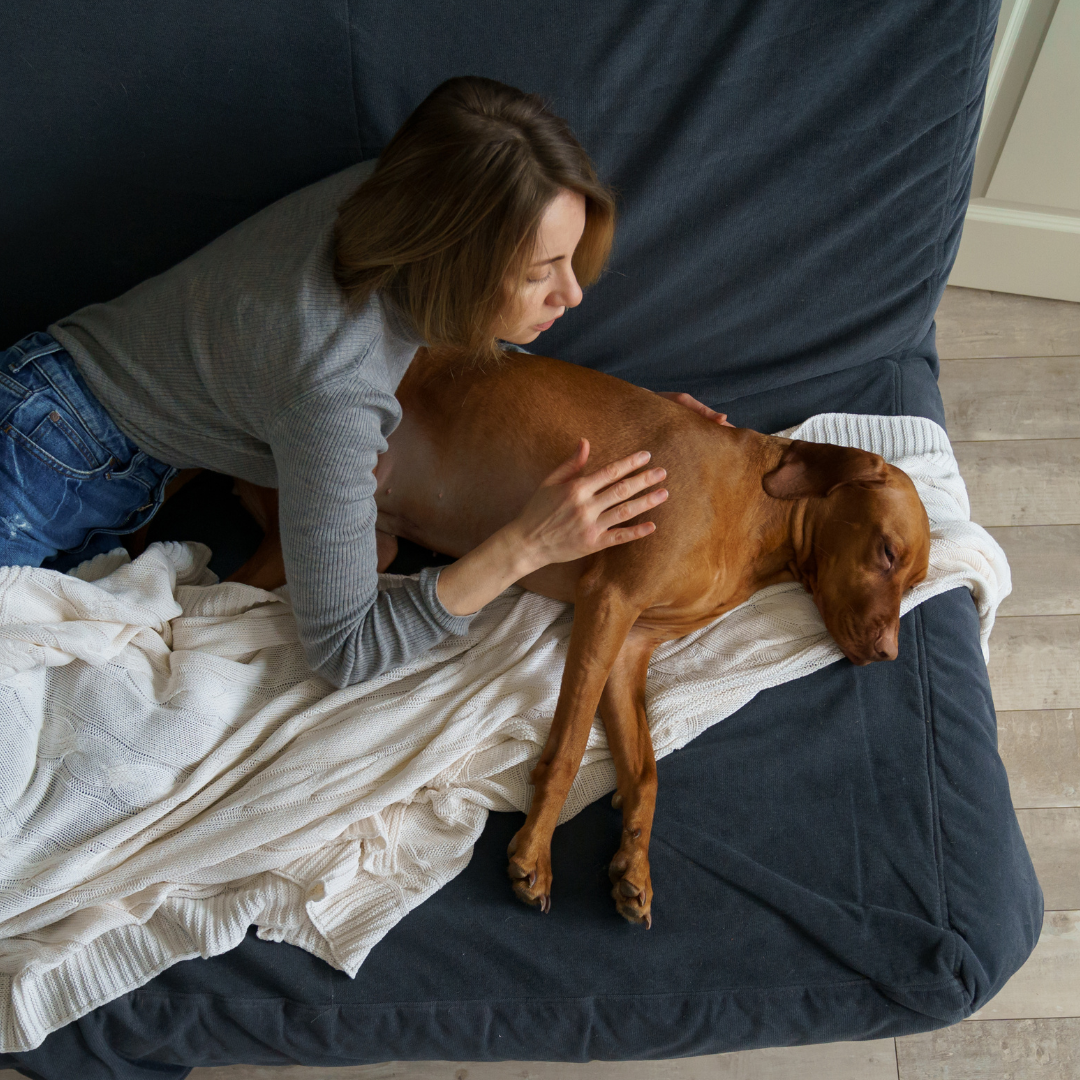When your dog’s tummy is irritated, it may actually be a case of canine colitis you’re dealing with. Colitis in dogs happens when his colon gets irritated or inflamed and can be a painful mess for your best friends. So what is the best treatment for colitis in dogs? As we always say, good dog gut health is key.
What is colitis in dogs?
Your dog’s digestive system is basically a long tube that connects his mouth to his rear end. Food (or other items) go in his mouth and move through the tube to be broken down, absorbed and excreted. Your dog’s colon is at the end of the tube, and that’s where indigestible foods are gathered and extra water is taken out. It’s where his poop is formed and readied to be excreted, and when it’s inflamed, that’s called dog colitis. Colitis in dogs can affect their poop in painful and messy ways and neither you nor your best friend are happy when your dog has colitis.
There are typically two types of colitis in dogs: acute and chronic. Acute colitis in dogs happens pretty quickly and often seemingly out of the blue. It is most likely triggered by something like your dog eating something that he shouldn’t or that didn’t agree with his tummy, or even from exposure to parasites or infection. As his gut works things out, he’ll usually be back to himself in a couple of days. This is why good gut health in the first place is so important.
Chronic colitis happens when your dog has colitis over and over. And over, sometimes. It’s usually more severe and a sign of underlying problems like Irritable Bowel Syndrome or Irritable Bowel Disease or even allergic reactions to something in foods or treats. Dogs with chronic colitis may have periods where the colitis is better but then it gets worse again, and it’s never a bad idea to check with your vet to see if there’s something severe going on. For many dogs, colitis can even be a symptom of mental health issues you need to address.
More often than not, though, acute colitis in dogs happens when they get into something they shouldn’t–trash, food, etc. and eat it. Or when they contract a viral infection or even come in contact with bacteria like E. Coli, Salmonella or Giardia. A healthy dog gut is usually the best defense against most triggers of acute chronic colitis.
What does colitis in dogs look like?
Whether your dog is dealing with chronic colitis or acute colitis, symptoms of colitis in dogs are similar. You might find they’re more gassy and they need to go poop more than they typically do. Most dog parents dealing with colitis see diarrhea as the first and most plentiful symptom. That said, it’s not uncommon for dogs with colitis to suffer from constipation either.
Chronic colitis in dogs may even have them losing weight and with a dull coat. This is typically because they’re not able to get the nutrients from the foods you’re feeding them as well as they should. You may see some blood or mucus in their stool, and they may be lethargic or act as if their tummy hurts because they may indeed be dealing with abdominal pain. If your dog’s colitis gets to the point that you feel he’s not acting himself or looking healthy (or see blood or mucus constantly in stool) you may want your vet to make sure he’s not going to suffer from dehydration or malnutrition.
What is the best treatment for colitis in dogs?
To treat colitis in your best friend will depend on whether it’s acute or chronic colitis. If it’s acute, and your dog’s gut is in good shape, he’ll likely be back to his happy self in a few days as his microbiome will defend against the inflammation in his colon. You may want to consider a lighter diet of easy-to-digest foods (rice, bland chicken, electrolytes, etc.) to help take the strain on his digestive system off and allow the probiotics and other beneficial flora in his gut to do their thing. You may also want to increase probiotics for a boost to that process.
If your dog is dealing with colitis due to a bacterial infection, your vet may want you to give him antibiotics, and you’ll want to make sure you’re taking care of his gut health because antibiotics will kill off beneficial bacteria too.
Bernie’s Perfect Poop can help prevent colitis in dogs before it starts.
The best way to prevent colitis in dogs is to have healthy guts. You can do that by making sure they eat high-quality and easily digestible food that’s high in quality fiber. But more importantly, you make sure they’re getting the most out of their food and absorbing the maximum nutrition they can by supplementing with Bernie’s Perfect Poop every meal.
Perfect Poop is a combination of premium fiber, pre- and probiotics and digestive enzymes that help ensure your dog has the best dog gut health he can. The fiber in Perfect Poop will help battle the symptoms of diarrhea and/or constipation he’s suffering and the pre- and probiotics will strengthen his gut to fight against whatever is causing the inflammation in the first place. Digestive enzymes will break his food down to allow optimal nutrient absorption, and this helps his gut fight back even more.
And there are two delicious flavors from which your dog can choose, so helping his gut ward off colitis can be easy for him and yummy for you!
After all, better health means a better life and nobody wants to deal with colitis if they don’t have to!


